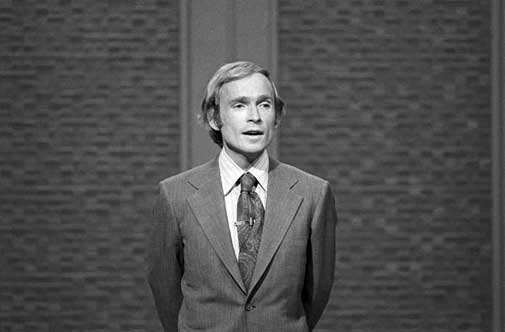
During a phone interview with Dick Cavett, when he mentions being at the home of Groucho Marx and one of the other dinner guests was Carly Simon, name-dropping just isn't suspected. On his television shows, and off the air too, he has talked with some of the more interesting people in the world...
And because Cavett is as gifted and natural a storyteller as he is an interviewer, fabled people easily turn into elements that illustrate his answers.
Before he began hosting his own show in the '60s, Cavett worked on Jack Paar's and Johnny Carson's versions of the Tonight show. He watched, he learned and he met the personalities who were guests on those shows.
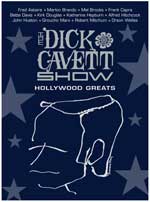
It was a logical progression when Cavett was given a show in which he asked the questions. He listened to the answers. His shows were funny, smart and engaging. Many of the people who appeared there felt relaxed and opened up to provide memorable interviews.
After a show, a guest often would ask, "How did you get me to talk about that?" Cavett says, adding they often followed the question with, "I felt so comfortable."
Shout Factory has released four collections of Cavett shows that prove the above statement much better than any writer can. (You can buy one or all by clicking HERE.)
Example: Katharine Hepburn, who rarely appeared on talk shows, just came into the studio to get a feel for Cavett's style after a friend recommended she do the show.
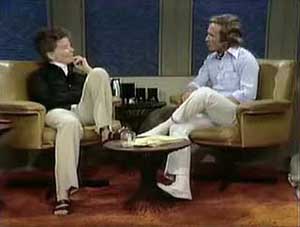
Cavett won her over almost effortlessly, it seems. With cameras recording as she rearranged some furniture and talked about ground rules, the visit turned into an entire program. She enjoyed it so much, she stayed on to tape a second.
Not all of his memorable shows were with movie stars. Writers Janet Flanner, Gore Vidal and Norman Mailer appeared on one that's a legend in itself. Vidal and Mailer were feuding at the time. Mailer, Cavett says, apparently came to the program after filling up at a bar. While Vidal and Mailer threw some full-force verbal punches at each other, Flanner added some jabs of her own; the audience took sides, and a frustrated Cavett answered a belligerent Mailer question about an alleged question sheet with, "Why don't you fold (the sheet) five ways and put it where the moon don't shine?"
The Hepburn show is part of the DVD release. The "moon don't shine" program is not, though Cavett hopes it will be available some day.
In his latest book, Talk Show, Cavett calls the latter "without doubt the damnedest show I ever did."
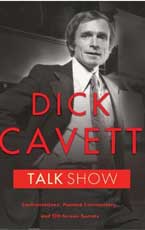
The book is a collection of the blogs he writes several times a month for The New York Times -- nearly flawless storytelling that often touches on the people who were his television guests.
(You can order the book HERE, and read Cavett's blogs HERE.)
Not all the writings are television-born. Others recall growing up in Nebraska, being the rare Nebraskan at the Yale of the 1950s, and "confrontations, pointed commentary and off-screen secrets" (the remainder of the book's full title).
They are recountings that might never grow past boring, were one of us telling them about our lives -- even if we had led a life even half as interesting as his. So much of the magic lies in the telling.
Which is a logical lead-in to a return to the Groucho Marx story.
Cavett was telling how Marx often boasted that, unlike his randy film persona, he was almost Victorian in his attitudes in private life -- "and then 10 minutes later tell a hilariously filthy joke."
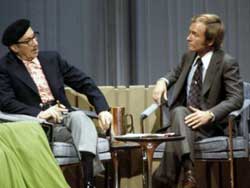
The clock inside Marx must have been ringing loudly, demanding an unusually off-color remark -- which he addressed at Ms. Simon. Cavett waded into Groucho's stream of thought and diverted it back to a better course. Simon told Cavett later that she fell in love with him for defusing the situation: "I felt my throat tighten and I couldn't speak," she said, when Groucho's words hit her.
"The sad part," Cavett says, "is that neither of us can remember what I said."
What part of sitting at dinner with Groucho and being told by Carly Simon she loved you wouldn't any person almost kill to have lived? But could any of us have told it in the simple and delightful way Cavett did during the interview?
He said he was surprised to recently read in a magazine story that his show's ratings were higher than the current Tonight show's. That's not the only way what he did tops many current talk shows. A lot of today's guests are on studio-bankrolled promotion tours for a movie, album or show -- the consistently worst being recently rejected reality show contestants. They move from one program to another, telling the same stories, showing the same clips and exiting as soon as the publicity seeds have been sown.
Cavett's guests showed up to talk, not to shill. They often would sit and talk with him for an entire show. It's the difference between being an interested guest and being a shill. Viewers felt they were part of an engaging conversation, not the equivalent of an Amway recruitment meeting. The audience was given credit for being smart enough to understand. Condescension wasn't judged to be an essential ingredient.
Even though what he did should be a model of what talk today could be, Cavett declines a request to rate today's shows or list the ones he watches. Except for the rare Norman Mailer rebuttal, a respectful decorum marked and still marks much of the way Cavett works. It's classy, it's fun to watch and before the style becomes extinct, one can hope that the endlessly cyclical nature of television swings back in that direction again.
Until that happens, watch the DVDs and read the book and the blog. Knowing what you're missing might be the start of a groundswell that makes the pendulum move more quickly.